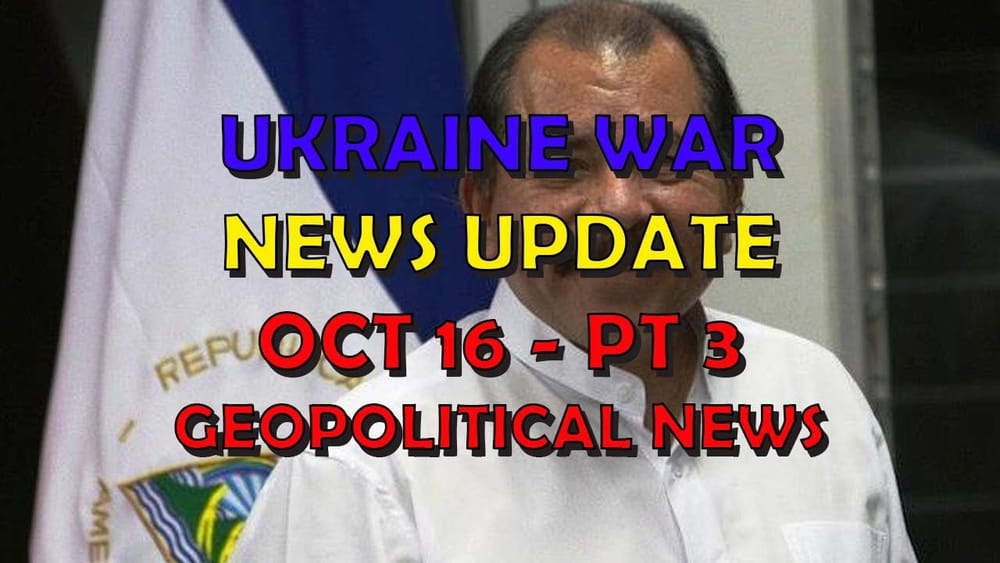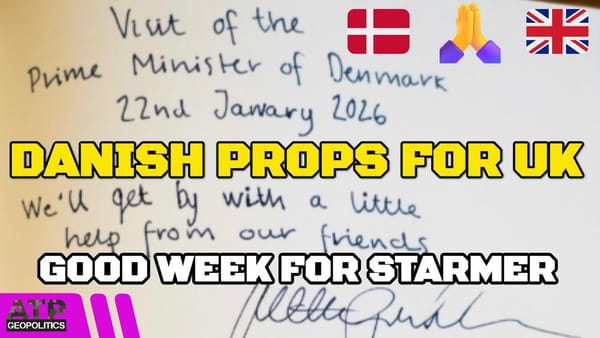Ukraine War Update NEWS: Geopolitical News
Table of Contents 📖
"Europe today is repeating the same mistake in information warfare that it made in conventional warfare. We are not dedicating enough resources to counter it."
Hello Team
🎦 00:01-00:33⏩
Jonathan welcomes viewers to the third part of his Ukraine War News Update for 16th October 2024, explaining it was initially part of a longer military aid video. He mentions a breaking news update: South Korea will send direct military aid to Ukraine if North Korean troops are spotted on the front line, promising to investigate further.
Return to top⤴️
US Concerned About North Korea-Russia Ties
🎦 00:35-01:59⏩
Jonathan discusses the US State Department's concern over reports of North Korean soldiers fighting alongside Russian forces, quoting spokesperson Matthew Miller. He analyses Miller's cautious language, noting that confirmed evidence would make the situation "wholly unacceptable". He suggests it's better to be cautious with pronouncements until there's concrete evidence of North Korean soldiers in Ukraine.
Return to top⤴️
North Korea-South Korea Border Tensions
🎦 01:59-03:25⏩
Jonathan highlights escalating tensions between North and South Korea, citing incidents like the North Koreans blowing up a road in the demilitarized zone and the South Koreans firing across the border. He mentions North Korean state media's claim of 1.4 million young people applying to join or rejoin the army, blaming Seoul for escalating tensions. He speculates that increased tensions, without actual conflict, could benefit Ukraine by making North Korea reluctant to deplete its ammunition and military resources by sending them to Russia.
Return to top⤴️
Biden to Meet with Quad Leaders in Berlin
🎦 03:25-03:46⏩
Jonathan reports that US President Biden will meet with leaders from Germany, France, and the UK (the Quad) in Berlin on 18th October 2024, to discuss the ongoing situation.
Return to top⤴️
Spain Seizes Chemicals Bound for Russia
🎦 03:48-04:18⏩
Jonathan reports that Spanish police have seized 13 tons of chemicals, including potential chemical weapon precursors, intended for Russia. Four suspects were arrested and charged with smuggling banned goods for attempting to bypass EU sanctions, which restrict the export of dual-use chemicals to Russia. He praises the Spanish Guardia Civil for their actions.
Return to top⤴️
India Reduces Russian Coal Imports
🎦 04:18-04:53⏩
Jonathan discusses India's significant reduction in Russian coal imports (26% in the first nine months of 2024), indicating a shift in the global coal trade. He emphasizes the goal of limiting Russia's financial resources for the war effort.
Return to top⤴️
Mysterious Intrusions into Finnish Water Infrastructure
🎦 04:53-07:01⏩
Jonathan reveals reports of intruders targeting Finnish water towers and treatment plants, mentioning similar incidents in other Scandinavian countries. He notes that nothing has been stolen but highlights the potential for scouting future attacks or causing public anxiety about water safety. Disabling water treatment or contaminating the supply could have severe consequences. Suspicion points towards Russia as a potential perpetrator of these intrusions. He asks his Finnish viewers for their perspectives on the situation.
Return to top⤴️
Russia's Disinformation Campaign in Germany
🎦 07:01-08:41⏩
Jonathan shifts focus to Russia's intensified disinformation campaign in Germany, citing warnings from officials and analysts about its impact on the country's politics. He quotes Bruno Kahl, head of the German intelligence service (BND), who states that Moscow's use of hybrid and covert measures is unprecedented and warns of a potential direct military confrontation with NATO. He links this to similar reports from other countries, including Poland and Baltic nations, expressing concern about Russia's interference and its potential implications.
Return to top⤴️
Olaf Scholz Calls Russian Soldiers Victims of Imperialist Madness
🎦 08:41-09:25⏩
Jonathan shares German Chancellor Olaf Scholz's statement in the Bundestag, where he referred to Russian soldiers in Ukraine as victims of the "imperialist madness" of the Russian president. Scholz emphasizes the tragic loss of life on both sides of the conflict and highlights the Russian president's aim to expand his country's territory, which Scholz deems unacceptable in Europe. Jonathan expresses agreement with Scholz's perspective.
Return to top⤴️
Jonathan's Philosophical Perspective on Russian Soldiers
🎦 09:26-09:43⏩
Jonathan offers a more philosophical viewpoint, seeing Russian soldiers as victims themselves, subject to brainwashing and cultural manipulation, rather than simply aggressors.
Return to top⤴️
The West's Underfunded Information War Against Russia
🎦 09:44-12:05⏩
Jonathan introduces a Twitter thread by Pekka Kallioniemi discussing the West's struggles in countering Russian disinformation. He highlights the suppression of pro-Western and pro-Ukrainian accounts on platforms like Twitter and their lack of resources compared to pro-Russian initiatives. He argues that the West needs to be more proactive in its information warfare approach, using truth and positive narratives to counter Russian disinformation.
Return to top⤴️
Europe's Neglect of Information Warfare
🎦 12:05-14:10⏩
Jonathan continues analysing Kallioniemi's thread, which compares Europe's underpreparedness in information warfare to its initial lack of preparedness for conventional warfare in Ukraine. He points out the disparity in funding between Russia's disinformation efforts (estimated at $3 billion in 2024) and the limited resources allocated by Western countries. He mentions allies like China, Iran, and North Korea potentially following Russia's lead. He cites various reports highlighting dwindling Western ammunition stocks, Russia's substantial propaganda budget, and the collaboration between China and Russia in spreading disinformation, as well as North Korean cyber warfare activities.
Return to top⤴️
The Lack of Cooperation and Rapid Response in the EU
🎦 14:10-17:05⏩
Jonathan emphasizes the lack of cooperation between EU countries and organisations in countering disinformation, citing Russia's extensive operations in Italy and Spain as examples. He mentions the case of the Spanish Vox party receiving funding from a bank linked to Viktor Orban, a close Russian ally, and highlights the deep connections between Italy and Russia, with many Italian companies still operating in Russia despite the war. He criticizes the EU's slow regulatory response, arguing that a rapid response strategy is crucial to combat the fast-paced nature of online disinformation campaigns.
Return to top⤴️
The Role of Social Media Movements like NAFO
🎦 17:05-18:15⏩
Jonathan discusses the potential of social media movements like NAFO (North Atlantic Fellas Organization) in countering Russian disinformation. He notes that NAFO, a pro-Ukrainian online community, has been effective in using humour and memes to challenge pro-Russian narratives. He cites the Kyiv Independent's opinion piece on NAFO's role in the "meme war" and highlights the alarming conclusion that the EU is losing the information war against Russia. He also mentions the rise of the far-right in Austria and Germany, fuelled by Russian interference, which further undermines European unity and support for Ukraine.
Return to top⤴️
US Efforts to Disrupt Russian Disinformation
🎦 18:15-19:05⏩
Jonathan shifts to the US context, noting the Department of Justice's efforts to disrupt covert Russian influence operations targeting US audiences. He cites examples like the indictments against Tenet Media and the Doppelganger project. He expresses concern that disinformation is becoming a core political strategy in the US, with foreign influence operations largely ignored.
Return to top⤴️
Elon Musk's Twitter and the Rise of Disinformation
🎦 19:05-20:04⏩
Jonathan argues that Elon Musk's acquisition and transformation of Twitter (now X) has exacerbated the disinformation problem. He claims that Twitter has become a haven for large-scale disinformation operations, citing a Russian operation that concluded X is the most effective platform for such activities. He criticises Musk for spreading propaganda memes himself and mentions the Center for Countering Digital Hate's report on the widespread reach of Musk's fake posts on US elections. He expresses a pessimistic view of the future given the current trends.
Return to top⤴️
Positive Signs and the Need for Transparency
🎦 20:04-21:15⏩
Despite the grim outlook, Jonathan points to some positive developments, highlighting the exposure of Russian kinetic operations planned against Ukraine and the West by Western intelligence agencies and think tanks. He mentions examples like the US warning of a potential false flag operation by Russia as a pretext for invading Ukraine in early 2022. He emphasizes the need for increased transparency regarding Russia's propagandists and their online activities, believing this would reduce their effectiveness. He advocates for a proactive "pre-bunking" approach to counter disinformation, rather than simply reacting to it.
Return to top⤴️
The Importance of Educating the Electorate
🎦 21:15-22:38⏩
Jonathan stresses the importance of educating the electorate about disinformation tactics, suggesting that public service broadcasters should inform people about how to identify trolls, bots, and manipulative content on platforms like Twitter. He shares his own experiences of feeling overwhelmed and depressed by the sheer volume of disinformation he encounters while researching, even though he is aware of the tactics used. He raises the question of how many accounts are actually genuine people versus bots or trolls.
Return to top⤴️
Nicaraguan Dictator's Remarks on Zelenskyy
🎦 22:38-23:00⏩
Jonathan briefly mentions Nicaraguan dictator Daniel Ortega's pro-Russian stance, quoting Ortega's statement calling Ukrainian President Zelenskyy a "son of Hitler" and a Nazi who wants to involve NATO in a war with Russia.
Return to top⤴️
Trump's Chicago Economic Forum Interview and Russian Media's Response
🎦 23:00-25:41⏩
Jonathan discusses Donald Trump's interview at the Chicago Economic Forum, which he considers "an unmitigated disaster". He criticises Trump's responses as nonsensical and indicative of a lack of understanding of economics. He contrasts this with the positive spin put on the interview by Trump's supporters, like Stephen Miller. Surprisingly, Jonathan notes that Russian state television, usually pro-Trump, offered a more honest assessment of the interview, acknowledging concerns about Trump's mental acuity. He finds it ironic that a source typically aligned with Trump is providing a more accurate portrayal than Fox News.
Return to top⤴️
Hungary's Engagement with Russia and UK's Response to Georgia
🎦 25:41-27:13⏩
Jonathan reports on Hungary's growing ties with Russia, highlighting a breach of NATO diplomatic protocol by Hungary's senior army chief engaging with Russia's military attaché. He mentions the disproportionately high number of Russian diplomats in Hungary compared to other Visegrad countries, suggesting Hungary is increasingly under Russian influence and acting as a proxy. He then discusses the UK's decision to suspend the Wardrop Strategic Dialogue with Georgia at the ministerial level, similar to the EU's pullback from accession talks. This is due to concerns about Georgia's pro-Russian leaning government. He explains this as a tactic to encourage the Georgian electorate to vote for pro-Western parties in upcoming elections, describing it as a "carrot and stick" approach.
Return to top⤴️
Wrap up
🎦 27:13-27:39⏩
Jonathan concludes the video, thanking viewers and acknowledging its length. He reveals his intention to split the video into two parts, separating the geopolitical news from the military aid updates. He signs off and says goodbye.
Return to top⤴️



